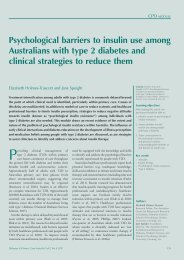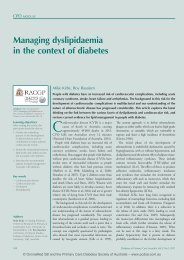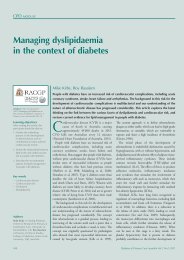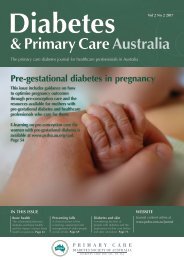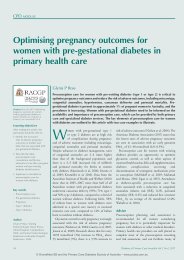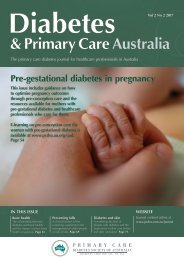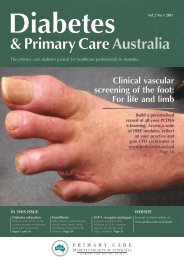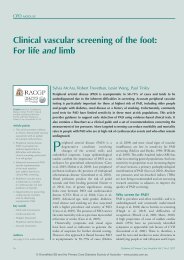DPCA2-2_issue_v2
Create successful ePaper yourself
Turn your PDF publications into a flip-book with our unique Google optimized e-Paper software.
Optimising pregnancy outcomes for women with pre-gestational diabetes in primary health care<br />
“Primary health<br />
care providers have<br />
critical roles to play<br />
in the assessment<br />
and management of<br />
contraception,<br />
pre-pregnancy<br />
assessment<br />
and care.”<br />
Conclusion<br />
Women of child-bearing age with pre-gestational<br />
type 1 or type 2 diabetes need to be counselled<br />
on the need for appropriate contraception at all<br />
times unless trying for pregnancy in the best<br />
possible circumstances to avoid adverse pregnancy<br />
outcomes. Most women with pre-gestational<br />
diabetes are able to have successful pregnancies.<br />
However, they are at much higher risk of having<br />
adverse pregnancy outcomes than women without<br />
diabetes (Macintosh et al, 2006; Dunne et al,<br />
2009). It has been shown that women who have<br />
had optimal pre-pregnancy care and best practice<br />
management of their diabetes, both before and<br />
throughout pregnancy, will have a substantially<br />
lower rate of adverse outcomes (Ray et al, 2001;<br />
Wahabi et al, 2010).<br />
Ideally, care should involve services that are<br />
specialised in diabetes in pregnancy. However,<br />
primary health care providers also have critical<br />
roles to play in the assessment and management of<br />
contraception, pre-pregnancy assessment and care,<br />
coordination of specialist services and ongoing<br />
support prior to, as well as throughout and<br />
following, the pregnancy. <br />
n<br />
Acknowledgement<br />
The author would like to acknowledge Melinda<br />
Morrison for assistance with article editing and<br />
referencing.<br />
American Diabetes Association (2017) Standards of Medical Care in<br />
Diabetes—2017. Diabetes Care 40(Suppl 1): S4–S5<br />
Australian Institute of Health and Welfare (2010) Diabetes in<br />
pregnancy: its impact on Australian women and their babies.<br />
AIHW, Canberra, ACT<br />
Dunne FP, Avalos G, Durkan M et al (2009) ATLANTIC DIP:<br />
pregnancy outcome for women with pregestational diabetes<br />
along the Irish Atlantic seaboard. Diabetes Care 32: 1205–6<br />
Egan, AM, Murphy HR, Dunne FP (2015) The management of type 1<br />
and type 2 diabetes in pregnancy. QJM: An International Journal<br />
of Medicine 108: 923–7<br />
Guerin A, Nisenbaum R, Ray JG (2007) Use of maternal GHb<br />
concentration to estimate the risk of congenital anomalies in the<br />
offspring of women with prepregnancy diabetes. Diabetes Care<br />
30: 1920–5<br />
Inkster ME, Fahey TP, Donnan PT et al (2006) Poor glycated<br />
haemoglobin control and adverse pregnancy outcomes in type 1<br />
and type 2 diabetes mellitus: Systematic review of observational<br />
studies. BMC Pregnancy Childbirth 6: 30<br />
Jensen DM, KorsholmL, Ovesen P et al (2009) Periconceptional A1C<br />
and risk of serious adverse pregnancy outcome in 933 women<br />
with type 1 diabetes. Diabetes Care 32: 1046–8<br />
Kitzmiller JL, Wallerstein R, Correa A, Kwan S (2010) Preconception<br />
care for women with diabetes and prevention of major congenital<br />
malformations. Birth Defects Res A Clin Mol Teratol 88: 791–803<br />
Macintosh MC, Fleming KM, Bailey JA et al (2006) Perinatal<br />
mortality and congenital anomalies in babies of women with<br />
type 1 or type 2 diabetes in England, Wales, and Northern<br />
Ireland: population based study. BMJ 333: 177<br />
Mahmud M, Mazza D (2010) Preconception care of women with<br />
diabetes: a review of current guideline recommendations. BMC<br />
Womens Health 10: 5<br />
McElduff A, Cheung NW, McIntyre HD et al (2005) The Australasian<br />
Diabetes in Pregnancy Society consensus guidelines for the<br />
management of type 1 and type 2 diabetes in relation to<br />
pregnancy. Med J Aust 183: 373–7<br />
Nielsen LR, Ekbom P, Damm P et al (2004) HbA1c levels are<br />
significantly lower in early and late pregnancy. Diabetes Care 27:<br />
1200–1<br />
Ray JG, O’Brien TE, Chan WS (2001) Preconception care and the risk<br />
of congenital anomalies in the offspring of women with diabetes<br />
mellitus: a meta-analysis. QJM 94: 435–44<br />
Wahabi HA, Alzeidan RA, Bawazeer GA et al (2010), Preconception<br />
care for diabetic women for improving maternal and fetal<br />
outcomes: a systematic review and meta-analysis. BMC<br />
Pregnancy Childbirth 10: 63<br />
58 Diabetes & Primary Care Australia Vol 2 No 2 2017



